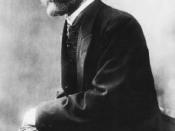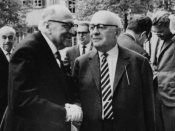Functionalism and conflict theory are two theories that influence the purposes of schooling. These two theories are both different and similar in their view and relation to schooling. Basically, the differences lie in the way these two theories explain transmission, as well as way functionalists are more accepting and conflict theorists want to change things. The two theories are similar in their views of structure and culture.
"Functionalism...argues that society operates as does the human body: Like living organisms, all societies possess basic functions which they must carry out to survive. Like living organisms, they evolve structures to carry out the functions" (Bennett deMarais and LeCompte, p. 5). Functionalism is a theory that certainly concentrates more on the social aspects and cultural aspects more than any other areas within the schooling systems. Based upon these two aspects, functionalists will try to recognize the social system. From there, functionalists explain how the school systems operate, while at the same time keeping order and equilibrium preserved.
Functionalists focus on intellectual, political, economical, and social purposes as what they perceive as the purposes of schooling. The intellectual purposes of schooling according to functionalists are learning and applying cognitive, substantive, and inquiry skills throughout their childhoods and on into their adulthoods. The functionalist view also states that the political purposes of schooling include educating children to become adults in this world that participate in politics, promote sharing history, encourage immigration, and are people who make sure order and obeying laws come into play. Economically, functionalists feel that schooling prepares children for their careers in life and also to choose and instruct the labor force. Lastly, functionalists believe that the social purposes of schools are to encourage social and moral responsibility, become places for people to solve social problems, and to become another place...



Good
Nice way and good details to state functionalism. Informing.
0 out of 0 people found this comment useful.